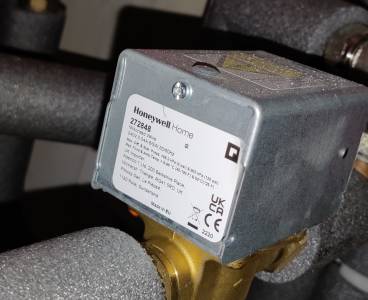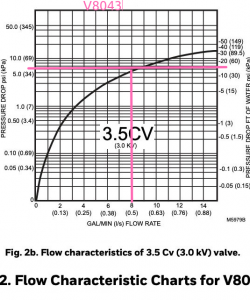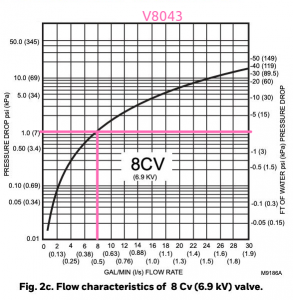@william1066 I do not usually use the ESBE valves. This is the one I usually use and they are available for next day delivery.
The valves you have, in reality, from tests I have run, bear no resemblance to the actual KV value.
A flow rate of 30 L/min seams a bit high, and will as you see, be costly to run, It is better to run the system on Delta T, if the heat pump cannot do it, Grundfoss Magna3 will do it for you.
I get the fact that Honeywell valves act as partial blockages and so throttle the system, but aren't they the standard fit item? Isn't this another example of most of the heat pump industry not really knowing what it is doing? I wonder how many installation don't have Honeywell (or Honeywell clone) valves?
Midea 14kW (for now...) ASHP heating both building and DHW
@cathoderay "Isn't this another example of most of the heat pump industry not really knowing what it is doing? I wonder how many installation don't have Honeywell (or Honeywell clone) valves? "
Correct, very few installations do not have them. Heat pumps need high flow, and restricting the flow costs money.
@heacol Thanks for the link. I already have a Grundfos Magna 3 [25-100]. I think I have a dodgy manual flow meter as well (seems to go down to 22mm in the middle despite being 1inch BSP on each end) then of course I have the zone valves.
In terms of delta T. At -2 deg, the heat loss is a phenomenal 15kW. Now we just put on another layer right now, and live with 15deg temp inside, but if I wanted to deliver for that heat loss, I need 30 litres per minute at delta T of 7.
Let me see what ripping out the zone valves and the mechanical flow rate meter does. (replacing with what you suggested)
A heat pump needs to be installed a certain way, as do condensing boilers to optimise them.
Prosaic understanding of heating (turning on and off, end user management etc) generally holds back the U.K. in its transition to heat pumps.
At the root of the issue are U.K. regulations, which are not sympathetic to, or understanding of, these design principles or the technology. Seeing this from afar exporters to the U.K. throw up their arms in despair and pursue volume sales. That means not upsetting the apple cart of buyers who are so far deep in the forest , they can not see the wood from the trees. After all lecturing to your buyers won’t favours sales. For this reason manufactures “dumb down” their schematics to accommodate U.K. understanding, Some manufacturers remove from market their more sophisticated products. And training, technical help and information sharing is minimised to what’s necessary to sell. The installer provides a useful “get out of jail card”.
Its not helped by NVQs, CIbse, British Gas and other large players being unaware of the changes needed, both in plant and understanding.
The change needed is actually quite daunting, but that’s because we in the U.K. will always be quick to say why a change won’t work, well before asking how the change can improve things, and what need’s to be done to effect the change and make life better.
Professional installer
@heacol What I am learning is how to understand the numbers. There is a big difference between getting 8.6 m3per hour with a 1 bar pressure drop (which is 10mh2o) and 17 m3per hour with a .7 mh20 pressure drop. If my maths is correct, a diverting valve has about 30 times less resistance than a zone valve [likely for a specific flow rate of course, more work needed here on my part]. Pretty important to understand the maths here, as I am slowly finding out.
On my 25-100 pump I really have a 10 mh20 "budget" to play with (at most). There is no water pump in the heat pump.
At least I have something to do this weekend 🙂
Regarding the Honeywell valves, I have this one installed:
Should I ask for it to be replaced with a different one? If so what should I tell/ask for from my installer? They're coming tomorrow to look at a very noisy pump so I want to discuss this at the same time.
ASHP: Mitsubishi Ecodan 8.5kW
PV: 5.2kWp
Battery: 8.2kWh
@scrchngwsl That is a good question, one I am trying to work out for myself. Ideally you need to know your target flow rate to start. This simple number is not so easy to get as it is likely to be variable, and ideally set by the heat pump controller and depend on a number of factors.
Assuming you have a flow rate range that will be required for the majority of the time. I guess you can then look ats the spec sheet of the zone valve vs the full bore diverting valve and do some maths on cost, some experiments on noise etc, look at your pump head spec etc.
A non trivial exercise which I need to undertake, and which could take some time. As a diy'er I tend to save time by doing rough calculations and over spec, not ideal, but one way to approach it. That is what I did with my pump and actually it turned to be only just big enough. I calculated 6.5 mh2o, it seems the pump needs close to 10mh2o pressure to get to 30 litres per min. And this is a bit too noisy for me right now, so I am looking at options (including moving the pump outside the house)
I am going to say that my maths is probably not correct here [earlier post that said 30x]. Will come back following some more thought. A quick look suggests diverting valve about 3 times less resistance not 30, but I need to spend a bit more time comparing things that are equivalent. Don't won't to panic anyone as a result of some low quality thought processes.
Posted by: @william1066Ideally you need to know your target flow rate to start. This simple number is not so easy to get as it is likely to be variable, and ideally set by the heat pump controller and depend on a number of factors.
This page has a useful calculator at the bottom, and even caters for systems with added glycol as well as just water. In fact the whole page is rather useful:
https://heatpumps.co.uk/technical/pressure-drops-flow-rates/
Midea 14kW (for now...) ASHP heating both building and DHW
- 26 Forums
- 2,396 Topics
- 54.3 K Posts
- 423 Online
- 6,077 Members
Join Us!
Worth Watching
Latest Posts
-
RE: RDSAP10 effect on existing heat pump EPC rating?
@mike-patrick interesting update - thanks.I've been thr...
By Tim441 , 24 minutes ago
-
RE: Advice for a novice on Mitsubishi Ecodan 6kW
In Ecodan world there are two bits of terminology that ...
By Sheriff Fatman , 26 minutes ago
-
RE: Recommended home battery inverters + regulatory matters - help requested
I remember reading in some inverters. They mandate a se...
By Batpred , 52 minutes ago
-
RE: Heatpunk Floor plan issues
I switched to Safari and it's working fine now.
By jamiejones85 , 1 hour ago
-

RE: Fan is clipping ice build up from the front of unit.
@majordennisbloodnok I’ll not go there thanks! Toodles.
By Toodles , 2 hours ago
-

RE: Running from backup generaor in powercut?
@majordennisbloodnok Back in the 80’ or 90’ we had a te...
By Toodles , 2 hours ago
-

RE: Setback savings - fact or fiction?
Just as an aside, I notice your graph has come from Hom...
By Majordennisbloodnok , 3 hours ago
-
RE: Running my new Nibe ASHP efficiently
I'm new to the forum. Did you get a reply to this last ...
By Mike @ Camelot , 4 hours ago
-

RE: ASHP Energy Consumption: Aira 12kW heat pump
@grantmethestrength MCS requirements for DHW capacity h...
By Toodles , 4 hours ago
-
RE: New Mitsubishi Ecodan 11.2kW installation - L9 errors and maybe more
Great to hear! I just figured this out a day or tw...
By anotherdaveuk , 5 hours ago
-
RE: Help me keep the faith with my air source heat pump installation
@adamk I'm observing my own system at low temperatures ...
By dr_dongle , 10 hours ago
-

RE: Free Ecoheat Heat Pump Install
@deltona Yes older houses are problematic like that, bu...
By bontwoody , 1 day ago
-
RE: Radiator sizing sanity check
As I mentioned early on the cost of supplying and fitti...
By JamesPa , 1 day ago
-
RE: Electricity price predictions
Great point, one of the key ones in my chat with Octopu...
By Batpred , 2 days ago
-

RE: New Fogstar 15.5kWh upright solution
Let me point out that there are many Chinese suppliers ...
By Transparent , 2 days ago
-

RE: Weather compensation- why you should use it
@majordennisbloodnok — The Two Ronnies Mastermind sketc...
By cathodeRay , 2 days ago
-
Just realised that this image of the cylinder cupboard ...
By Sheriff Fatman , 2 days ago
-

RE: Rodents! A word of warning for heat pump owners
Two thoughts: 1: Let's ask @david-s if Primary Pro in...
By Transparent , 2 days ago
-
RE: Solis S6-EH1P8K-L-PLUS – Why I Chose It and What I’ve Learned So Far
In the diagram below, I describe my understanding of th...
By Batpred , 2 days ago
-
I need to have a look out for it. I know IBM feeds some...
By Batpred , 2 days ago








